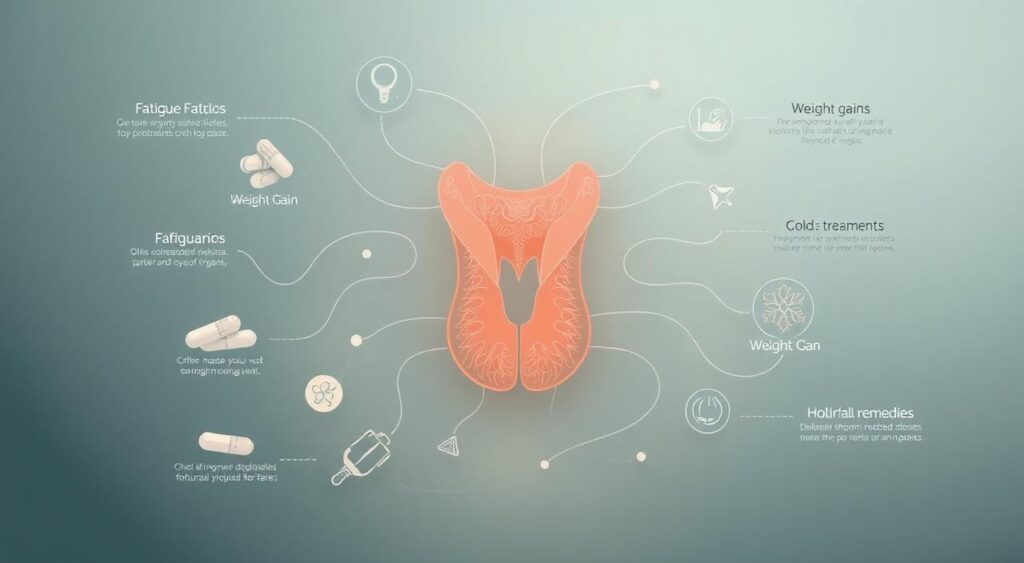Learn about the key factors behind hypothyroidism, the signs and symptoms to watch for, and the most effective treatment options.
Hypothyroidism: This is a common thyroid disorder where the thyroid gland doesn’t make enough thyroid hormones. These hormones are key for many bodily functions. It’s crucial to know the causes, symptoms, and treatments of hypothyroidism.

Hypothyroidism happens when the thyroid gland doesn’t make enough thyroid hormones. These hormones help control metabolism, growth, and development. Symptoms can range from mild to severe. It’s important to recognize these signs and get medical help if needed.
By understanding hypothyroidism, people can manage their thyroid health better. This knowledge helps individuals take charge of their condition.
Key Takeaways
- Approximately 4.6% of the US population suffers from hypothyroidism, a common thyroid disorder.
- Hypothyroidism occurs when the thyroid gland does not produce enough thyroid hormones.
- Thyroid hormones play a crucial role in regulating metabolism, growth, and development.
- Recognizing the signs of hypothyroidism is essential for seeking medical attention and managing the condition.
- Effective treatments for hypothyroidism are available, and individuals can take control of their thyroid health with proper education and awareness.
- Hypothyroidism can have significant consequences on an individual’s quality of life if left unmanaged.
Understanding Hypothyroidism: An Overview
Hypothyroidism is when the thyroid gland doesn’t make enough thyroid hormone. This leads to a thyroid hormone deficiency. Symptoms include fatigue, weight gain, and dry skin, common signs of hypothyroidism.
The thyroid gland is key for metabolism, growth, and development. It makes T3 and T4 hormones, controlling the body’s metabolic rate. Without enough hormones, the body’s function is greatly affected.
What is Hypothyroidism?
Hypothyroidism can be caused by many things, like autoimmune disorders or thyroid surgery. It’s also caused by a thyroid hormone deficiency. A blood test can diagnose it.
How the Thyroid Gland Functions
The thyroid gland is a small, butterfly-shaped gland in the neck. It makes hormones that control metabolism, growth, and development. When it works right, it makes the right amount of hormones. But if it doesn’t, it can lead to symptoms of hypothyroidism.
Impact on Body Systems
Hypothyroidism affects the body’s systems, like the heart, nerves, and digestion. It causes symptoms like fatigue, weight gain, and dry skin. These can be managed with treatment.
- Fatigue and weakness
- Weight gain and difficulty losing weight
- Dry skin and hair loss
- Cold intolerance and sensitivity to heat
- Depression and anxiety
Knowing about hypothyroidism’s causes and symptoms helps manage it. This improves health and wellbeing.
Common Causes of Underactive Thyroid
Hypothyroidism can be caused by several factors. These include autoimmune disorders, thyroid surgery, radiation therapy, and certain medications. These factors can lower thyroid hormone production, causing hypothyroidism. Autoimmune disorders, like Hashimoto’s thyroiditis, are a common cause. They happen when the immune system attacks the thyroid gland, causing inflammation and damage.
Other causes of hypothyroidism include:
- Thyroid surgery, which can damage the thyroid gland and lead to a decrease in hormone production
- Radiation therapy, which can damage the thyroid gland and lead to hypothyroidism
- Certain medications, such as lithium and iodine, which can interfere with thyroid function
Knowing the causes of hypothyroidism is key to effective treatment. By identifying the cause, individuals can work with their healthcare provider. Together, they can create a treatment plan to manage symptoms and improve health.
| Cause | Description |
|---|---|
| Autoimmune disorders | Hashimoto’s thyroiditis, where the immune system attacks the thyroid gland |
| Thyroid surgery | Damage to the thyroid gland during surgery, leading to decreased hormone production |
| Radiation therapy | Damage to the thyroid gland from radiation, leading to hypothyroidism |
| Certain medications | Medications such as lithium and iodine, which can interfere with thyroid function |
Risk Factors and Predisposing Conditions
Knowing the risk factors and conditions that lead to hypothyroidism is key for managing it well. Certain health issues, like thyroiditis and problems with the pituitary gland, can raise the risk. Also, lifestyle and environmental factors, like diet and chemical exposure, can play a part.
Getting a proper hypothyroidism diagnosis is important. It helps spot these risk factors and conditions. Some main risk factors include:
- Genetic factors, such as a family history of thyroid disease
- Medical conditions, such as thyroiditis and pituitary gland problems
- Lifestyle and environmental factors, such as diet and exposure to certain chemicals
Knowing these risk factors and conditions helps people take steps to prevent or manage hypothyroidism. By making smart lifestyle choices and getting the right medical care, people can lower their risk. This can also improve their overall health.
Recognizing the Signs of Hypothyroidism
It’s important to know the symptoms of hypothyroidism for effective treatment. The signs can differ from person to person. But, there are common ones to watch for. Catching it early is key to managing it and avoiding complications.
Early Warning Signs
Early signs include feeling tired, gaining weight, and dry skin. These symptoms might seem minor at first but can get worse if not treated. Other early signs are hair loss, feeling cold easily, and muscle weakness.
Advanced Symptoms
As hypothyroidism gets worse, symptoms can get more severe. These might include feeling depressed, anxious, or having trouble remembering things. Some people might also have irregular or heavy periods, and issues with fertility. If these symptoms get worse or don’t go away, it’s crucial to see a doctor.

Emergency Warning Signs
In rare cases, hypothyroidism can lead to serious emergencies like myxedema coma. This is a life-threatening condition that needs immediate help. Other emergency signs are seizures, hallucinations, and losing consciousness.
Knowing the signs of hypothyroidism is key to getting the right treatment. By recognizing these symptoms early, people can get help before it gets worse. With the right care, those with hypothyroidism can live healthy, active lives.
| Symptom | Description |
|---|---|
| Fatigue | Feeling tired or weak |
| Weight Gain | Unexplained weight gain |
| Dry Skin | Dry, rough, or itchy skin |
The Diagnosis Process
Diagnosing hypothyroidism involves several steps. First, doctors take a detailed medical history. They look for symptoms or risk factors that might point to hypothyroidism. Then, a physical exam is done to check for signs like dry skin, hair loss, or swelling.
Lab tests are key in diagnosing hypothyroidism. The Thyroid-Stimulating Hormone (TSH) test is often used. High levels of TSH show the thyroid gland isn’t making enough hormones, leading to a diagnosis of hypothyroidism.
Other tests might include:
- Free Thyroxine (FT4) test: checks FT4 levels in the blood
- Free Triiodothyronine (FT3) test: checks FT3 levels in the blood
- Thyroid antibody tests: measure antibodies against the thyroid gland
A diagnosis of hypothyroidism is usually made when TSH is high and FT4 and FT3 are low. Sometimes, doctors might diagnose it based on symptoms and history alone, even if lab results aren’t clear.
| Test | Description |
|---|---|
| TSH test | Measures the level of TSH in the blood |
| FT4 test | Measures the level of FT4 in the blood |
| FT3 test | Measures the level of FT3 in the blood |
Medical Treatments and Medication Options
Hypothyroidism treatment often means taking medication to replace missing thyroid hormones. This is called hormone replacement therapy. It helps to ease symptoms caused by a lack of thyroid hormones. The main aim is to get thyroid hormone levels back to normal and reduce symptoms.
There are many medications for treating hypothyroidism, like synthetic thyroid hormones like levothyroxine. It’s important to talk to a healthcare provider to find the right treatment. They will also check thyroid hormone levels regularly.
Types of Medication
- Levothyroxine (T4)
- Liothyronine (T3)
- Natural desiccated thyroid
It’s key to keep an eye on treatment and adjust it as needed. This might mean blood tests to check hormone levels and changing medication doses. With the right treatment plan and healthcare team, people with hypothyroidism can manage their condition well. This helps to reduce symptoms of thyroid hormone deficiency.
Living with Hypothyroidism: Lifestyle Modifications
Managing hypothyroidism requires both medical care and lifestyle changes. Simple daily habits can help control symptoms and enhance life quality. A balanced diet, regular exercise, and stress control are key to hypothyroidism management.
Here are some tips for living with hypothyroidism:
- Eat a diet rich in fruits, vegetables, and whole grains.
- Engage in activities like walking or yoga to manage stress and boost mood.
- Try stress-reducing methods like meditation or deep breathing.
- Ensure you get enough sleep to regulate hormones.
By adopting these lifestyle changes, you can better manage your hypothyroidism symptoms. Always consult with your healthcare provider to create a personalized hypothyroidism management plan.
Combining medical treatment with lifestyle adjustments can help you manage hypothyroidism. Focus on your health and make a few simple changes to your routine. This way, you can control your symptoms and improve your overall well-being.
Diet and Nutrition Guidelines
Managing hypothyroidism requires a complete approach, including diet and nutrition. A well-planned diet can ease symptoms and boost health. It’s key to eat foods that help the thyroid function well.
A healthy diet for managing hypothyroidism should include foods high in iodine, selenium, and zinc. These minerals are vital for thyroid health and metabolism. Some good foods are:
- Fatty fish, such as salmon and tuna, which are rich in selenium and omega-3 fatty acids
- Dairy products, like milk and cheese, which are rich in iodine
- Nuts and seeds, such as Brazil nuts and pumpkin seeds, which are rich in selenium and zinc
But, some foods can make hypothyroidism symptoms worse. It’s best to avoid them. These include:
- Processed foods, which are often high in sugar and unhealthy fats
- Soy products, which can interfere with thyroid function
- Cruciferous vegetables, such as broccoli and cauliflower, which can inhibit thyroid function if consumed in excess

Along with diet changes, supplements might be needed to support thyroid health. Supplements like iodine and selenium can help. But, always talk to a healthcare professional before starting any supplements.
Exercise and Physical Activity Recommendations
Regular exercise is key for managing hypothyroidism. It helps ease symptoms and boosts health. Always talk to a doctor before starting a new workout plan, especially if you have hypothyroidism.
Here are some tips for starting exercise with hypothyroidism:
- Start slow and gradually increase how hard and long you work out
- Choose low-impact activities like walking or yoga to avoid too much strain
- Add strength training to build muscle and speed up your metabolism
- Rest when you need to to avoid getting too tired
Exercise can help with hypothyroidism symptoms like tiredness and weight gain. It also supports your overall health and happiness. By adding physical activity to your daily life, you can manage your thyroid hormone deficiency better and live a better life.
Always check with a healthcare provider before starting any new exercise, especially with hypothyroidism or other health issues. With the right exercise plan, you can manage your hypothyroidism and improve your health and happiness.
| Exercise Type | Benefits for Hypothyroidism Management |
|---|---|
| Walking | Low-impact, easy to start, and can help improve mood and energy levels |
| Yoga | Can help reduce stress, improve flexibility, and boost metabolism |
| Strength Training | Can help build muscle, boost metabolism, and improve overall health and well-being |
Managing Hypothyroidism During Pregnancy
Pregnancy can be tough for women with hypothyroidism. It’s key to manage hypothyroidism well to have a healthy baby. Hypothyroidism treatment needs special care during pregnancy to avoid problems.
A thyroid disorder can harm the fetus. Untreated hypothyroidism raises the risk of miscarriage and other issues. So, it’s vital to work closely with a healthcare provider.
Special Considerations
Women with hypothyroidism should know these special things during pregnancy:
- Increased thyroid hormone needs
- Regular checks of thyroid hormone levels
- Changes to hypothyroidism treatment if needed
Treatment Adjustments
Thyroid disorder treatment might need changes in medication. It’s important to work with a healthcare provider to find the right treatment. They will also check thyroid hormone levels often.
Monitoring Requirements
It’s crucial to keep an eye on thyroid hormone levels during pregnancy. This includes:
- Regular blood tests for thyroid hormone levels
- Watching for signs and symptoms of hypothyroidism
- Changing hypothyroidism treatment if needed
| Pregnancy Trimester | Thyroid Hormone Level Monitoring |
|---|---|
| First Trimester | Every 4-6 weeks |
| Second Trimester | Every 6-8 weeks |
| Third Trimester | Every 4-6 weeks |
Conclusion: Taking Control of Your Thyroid Health
Managing hypothyroidism starts with you. It’s important to understand the causes and symptoms. Working with your healthcare provider is key to treating thyroid hormone deficiency and improving your health.
Hypothyroidism is treatable, and you can feel better. Keep an eye on your symptoms and adjust your treatment as needed. With the right care and healthy habits, you can overcome hypothyroidism and live well.
Your thyroid health is up to you. Use the knowledge and resources to manage your hypothyroidism. By taking control, you can improve your overall health and feel more alive.
FAQ
Q: What is hypothyroidism?
A: Hypothyroidism is when the thyroid gland doesn’t make enough thyroid hormones. This slows down the body’s metabolism and other functions.
Q: What are the common symptoms of hypothyroidism?
A: Symptoms include feeling very tired, gaining weight, and feeling cold easily. You might also have constipation, dry skin, depression, and muscle cramps.
Q: What are the main causes of hypothyroidism?
A: Main causes are autoimmune disorders like Hashimoto’s thyroiditis. Other causes include thyroid surgery, radiation, or certain medicines.
Q: How is hypothyroidism diagnosed?
A: Doctors use a blood test to check TSH and thyroid hormone levels. This helps diagnose hypothyroidism.
Q: How is hypothyroidism treated?
A: Treatment is hormone replacement therapy. This means taking synthetic thyroid hormones like levothyroxine to balance hormone levels.
Q: What dietary changes can help manage hypothyroidism?
A: Eat a balanced diet with iodine-rich foods like seafood and dairy. Avoid processed foods and too much soy.
Q: How can exercise benefit individuals with hypothyroidism?
A: Exercise helps manage weight and boosts energy. Start slowly and talk to a doctor before beginning any new workout.
Q: Are there any special considerations for managing hypothyroidism during pregnancy?
A: Yes, pregnant women need closer monitoring and thyroid medication adjustments. This ensures the baby and mother’s health.
